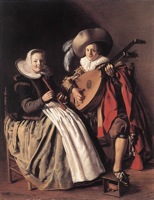Difference between revisions of "Duet"
(Created page with 'File:lighterstill.jpg A '''duet''' is a musical composition or piece for two performers. In [http://en.wikipedia.org/wiki/Classical_music classical music], the term is m...') |
|||
| Line 1: | Line 1: | ||
| − | [[File:lighterstill.jpg]] | + | [[File:lighterstill.jpg]][[File:Duet.jpg|right|frame]] |
A '''duet''' is a musical composition or piece for two [[performers]]. In [http://en.wikipedia.org/wiki/Classical_music classical music], the term is most often used for a composition for two singers or pianists; with other instruments, the word '''''duo''''' is also often used. A piece performed by two pianists performing together on the same piano is referred to as piano duet or piano four hands. A piece for two pianists performing together on separate pianos is referred to as a piano duo. | A '''duet''' is a musical composition or piece for two [[performers]]. In [http://en.wikipedia.org/wiki/Classical_music classical music], the term is most often used for a composition for two singers or pianists; with other instruments, the word '''''duo''''' is also often used. A piece performed by two pianists performing together on the same piano is referred to as piano duet or piano four hands. A piece for two pianists performing together on separate pianos is referred to as a piano duo. | ||
Revision as of 16:46, 7 December 2009
A duet is a musical composition or piece for two performers. In classical music, the term is most often used for a composition for two singers or pianists; with other instruments, the word duo is also often used. A piece performed by two pianists performing together on the same piano is referred to as piano duet or piano four hands. A piece for two pianists performing together on separate pianos is referred to as a piano duo.
"Duet" is also used as a verb for the act of performing a musical duet, or colloquially as a noun to refer to the performers of a duet. The word is also occasionally used in reference to non-musical activities performed together by two people.
In Renaissance music, a duet specifically intended as a teaching tool, to be performed by teacher and student, was called a bicinium (see Étude).
